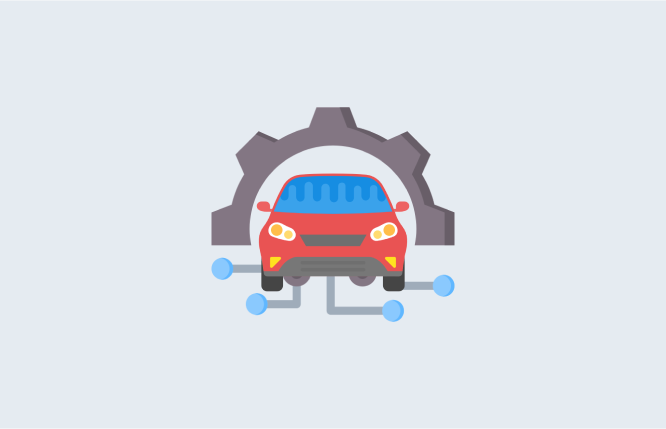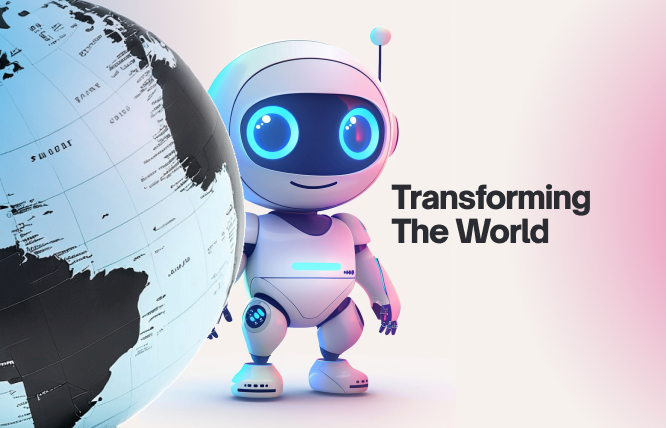Introduction
Automotive digital transformation is taking the world by storm. It is associated with wide-ranging benefits but also encounters considerations and challenges.
We are living in a truly transformative era. This is because we are witnessing a profound technological transformation in a host of industries. One of these industries is the automotive one. The automotive digital transformation is driven by digital technologies. Whether it is vehicle connectivity or manufacturing processes, digitalisation is revolutionising all features of the automotive value chain. It comes as a no-brainer that one of the essential areas where the ongoing transformation is clearly visible is the idea of connectedfactories.
Thanks to the capabilities of the Internet of Things (IoT), automation and data analytics, today’s automotive manufacturers are able to enhance efficiency, optimise production processes, and attain innovation-related opportunities. Throughout this blog, you will learn how connected factories can drastically change the automotive industry, thereby stepping into the era of productivity and efficiency.
Readers must understand that the information stated here is especially meant for those who have just begun their careers in the automotive industry. Let’s say that you are a professional who is looking for ways to introduce enhancement in his automotive company. In that case, you will find plenty of wisdom points in this blog, which will be of benefit to you both in the short and long run. But when you are done reviewing this entire blog, you must understand that the automotive industry is going through a continuous evolution phase.
This is why it will be best for you to take as much cue as you can from this piece and then do your own research into the subject matter. While you are on the topic, it will be best for you to take a look at a host of concepts, such as custom CMS solutions, progressive website application, or even software design services.
Glancing at Automotive Digital Transformation
Throughout time, automotive manufacturing was seen as a highly structured and labor-intensive process. Some of its highlights were mass production techniques and large-scale assembly lines. However, due to the arrival of ground-breaking digital technologies, manufacturing processes have experienced a massive shift. Many experts have come to argue that connected factories are now showcasing themselves as the evolution of automotive production. This is where processes, systems, and machines are interconnected with each other. The result is the creation of an efficient and seamless manufacturing system.
Some argue that the concept of connected factories is so vast and detailed that it is immensely impacting the industries that are closely linked with vehicles. This is a debatable point. Regardless, no one can deny the importance of connected factories and how they will affect manufacturers across the globe.
Technologies That Drive Connected Factories
Many technologies are considered the driving force behind automotive manufacturing’s transformation into connected factories. Let’s have a look at them in some detail:
Internet of Things (IoT)
There are many IoT devices embedded in manufacturing equipment, such as actuators and sensors. This is for the purpose of real-time data collection on environmental conditions, product quality, and machine performance. All of this data then goes through an analysis process in order to predict maintenance needs, optimise processes, and identify patterns. This will then pave the way for continuous improvement alongside proactive decision-making.
Some argue that the sheer amount of IoT devices being utilised brings a challenge of its own. This is regarding the maintenance of the IoT devices. Therefore, if you are a manufacturer, then you must seriously consider this point. This is directly related to your successful and efficient usage of the IoT technology.
Big Data Analytics
A great amount of data is produced by IoT devices. This data is then analysed and processed with the aid of advanced analytics techniques, i.e. artificial intelligence and machine learning. As automotive manufacturers are able to harness big data’s power, they get precious insights into supply chain disruptions, quality issues, and production inefficiencies. This lets them steer operational excellence and conduct data-driven decisions.
If this is the first time that your organisation deals with big data analytics, then it will be best for you to conduct a thorough consultation with the relevant experts. These experts will guide you on your relative matters. Just make sure that you explain to them in detail your overall industry-related situation, and how you intend to make the most out of the big data analytics.
Automation and Robotics
Automation and robotics technologies are in the process of deployment in connected factories. This is for the sake of enhancing productivity, improving precision, and streamlining production processes. Several experts who take a close look at automotive digital transformation have noted that collaborative robots, robotic arms, and automatic guided vehicles work in tandem with human operators. The result is the minimisation of errors, reduction of cycle times, and the performance of repetitive tasks. All of this means lower manufacturing costs and higher throughput.
Some argue that the attainment of robotics is costly for any organisation. This is something that an organisation must seriously look into.
Digital Twins
These are virtual replicas of physical assets, like equipment and production lines, which imitate their performance and behaviour in real-time. When automotive manufacturers are able to make digital twins of manufacturing processes, they can simulate scenarios, test strategies, and optimise production workflows. All of this is for the sake of minimising downtime and improving efficiency.
Benefits Associated with Connected Factories
There are a host of benefits associated with connected factories for automotive manufacturers. Let’s look at these in some detail. If you are interested in the tech industry, then after going through these benefits, you should take a look at a host of other concepts too, such as business management software solutions, workshop management software or even technology solutions for business.
Let’s come back to the benefits:
Enhanced Efficiency
Connected factories are able to leverage analytics and real-time data. This allows them to minimise downtime, optimise workflows, and identify bottlenecks. The result is the attainment of lower operating costs and a higher degree of production efficiency.
Many critics argue that this enhanced efficiency is immensely valuable for any manufacturer who is operating in a competitive environment. This is true on many levels.
Improved Quality
Thanks to a host of IoT sensors and analytics, manufacturers are able to monitor product quality at all stages of the production process. This allows them to correctly identify deviations or defects from specifications, thereby commencing with real-time corrective actions. The outcome here is to ensure customer satisfaction and high quality standards.
Furthermore, if the customers are satisfied with improved quality, they are likely to pass on a positive recommendation to their peers. This will go on to benefit any manufacturer with both its short and long term profits.
Better Flexibility
It is commonly observed by the experts of automotive digital transformation that connected factories behave in a more adaptable and agile manner. This behavior is due to the evolving market demands. This goes on to let the manufacturers swiftly respond to customer preferences, introduce product variants, and reconfigure production lines. All of this means increasing competitiveness and market responsiveness shown on their behalf.
Predictive Maintenance
Connected factories are able to analyse equipment performance data. This allows them to predict maintenance needs and potential failures before they can happen. This means that the manufacturers are in a better position to extend critical assets’ lifespan, minimise unplanned downtime, and proactively schedule maintenance activities.
All of this means that the manufacturers will stand in a better position to get the most out of their given resources.
Sustainable Operations
A manufacturer can minimise environmental impact, decrease waste, and optimise energy consumption via better efficient production processes and smarter resource management because of connected factories. This goes on to contribute towards responsible and sustainable manufacturing practices.
There are many manufacturers present all over the world that are proud of their sustainable operations record.
Decreased Operational Costs
Let’s look at the decreased operational costs factor in better detail. If a manufacturer is able to control costs all the while raising outputs, this will have a very positive impact on the manufacturer’s overall operations. Sure, it is also true that this controlling factor has become a massive challenge for manufacturers. Still, there are many studies and works that have been done that intend to make this challenge easy.
In light of this, let’s take a look at some ways in which digital systems and tools can assist:
- Augmented reality training will go on to improve productivity
- Forecasting software will decrease waste
- Smart building upgrades will conserve energy
If any organisation has taken good note of these and other benefits and is looking to go through the transitioning to technology phase, it must seek out a good balance. A proper understanding of workforce barriers will allow the adoption to be smoother. Additionally, due to the gradual rollout, there will be better management of change as a whole.
Cases Where Automotive Manufacturers Permitted Connected Factories
Toyota
This company has gone for a “smart factory” approach. This means the integration of data analytics, robotics, and IoT sensors into its manufacturing operations. This is done to make a more responsive and agile production environment. Thanks to Toyota’s connected factories, it has been successful in the attainment of better customer satisfaction levels, increased production facilities, and reduced lead times. This happens because Toyota delivers customised vehicles in an efficient and quick manner.
BMW
This company has implemented robust and reliable IoT-enabled production systems across its manufacturing facilities. This is for the sake of enhancing workforce productivity, improving quality control, and optimizng production processes, all by utilising real-time data analytics. Thanks to connected factories, it has been observed that BMW has attained operational efficiencies and notable cost savings, all the while keeping in line with its quality standards throughout the product lineup.
Ford
Many Ford critics are in awe of the fact that it has successfully utilised the digital twins technology. This is done in order to optimise and simulate its manufacturing processes. This will then allow it to improve its efficiency, identify potential issues, and test production strategies. When Ford is able to make digital replicas of its presently existing production facilities, it goes on to improve its time-to-market for vehicles, decrease waste, and minimise downtime. All of such perks are generally the hallmarks of a successful automotive digital transformation.
Considerations and Challenges
There is no doubt that connected factories’ benefits in automotive manufacturing are impressive. However, this does not take away the fact that there are a host of considerations and challenges that manufacturers must take note of. Let’s have a good look at them:
Privacy and Data Security
There are many industry experts who have raised concerns regarding the increased data sharing and connectivity in connected factories. These concerns are with regard to privacy and data security. Here, manufacturers must make sure that they are able to keep sensitive data safe from any sort of unauthorised access and cyber threats. In light of this, there have been a host of cases where data theft and cyber attacks have caused innumerable damage to companies. Today’s automotive manufacturers take good note of such cases as well.
Skills Gap
If any given organisation wants to transition to connected factories, it needs a well-capable and skilled workforce. This workforce should be capable of leveraging and managing digital technologies. Therefore, it is safe to assume that today’s automotive manufacturers should perform a thorough amount of investing in the upskilling and training of their workforce. All of this will ultimately go on to ensure that they harness all the required expertise to maintain/operate connected production systems. Here, there are a host of successful case studies that the manufacturers can take note of, which belong to some of today’s biggest manufacturers.
Integration Complexity
The integration of disparate technologies and systems in connected factories could turn out to be a very challenging and complex affair. This means that it could demand careful coordination and planning, which will ultimately ensure data exchange and seamless interoperability throughout the complete manufacturing ecosystem. The good news here is that there are experts available who are well-versed in such matters. Perhaps it will be best for any given manufacturer to reach out to such experts, as they can offer valuable insights into the given integration-related challenges.
Regulatory Compliance
It is extremely important for any automotive manufacturer to comply with a host of industry standards and regulatory requirements when applying connected factory solutions. These are associated with environmental sustainability, product safety, and data protection. It is commonly seen that if a manufacturer is able to adhere to all of the required regulatory compliance, it can conduct its business affairs in an ethical manner. Here, it is imperative to state that when other organisations see a manufacturer conducting its operations in an ethical manner, they are more inclined to conduct business with it.
Technology Cost
When there is an automotive digital transformation, it will incur a significant amount of costs for a manufacturer. This will put a strain on the existing budgets. There are reports that suggest that on average, a single digital transformation project can put a bill of more than $25 million on a manufacturer. There is little denying the fact that automotive digital transformation costs are high. Still, if a manufacturer fails to perform this funding, then this will adversely affect its long-term competitive behavior. This is why those organisations that are struggling on the financial front should figure out financing options that offer them ease with their relevant cash flow situation.
While performing the transformation, any organisation must take into consideration that new technologies offer additional efficiency gains in the future. This will then go on to close the spend-benefit gaps. One thing that can be done is to go with a phased IT modernisation roadmap. This is important because it will assist in balancing high-impact areas on a priority note. As a result, innovation will proceed in waves.
Concluding Remarks
Throughout this entire blog, it has been established that connected factories highlight a transformative paradigm shift happening in automotive manufacturing. This allows manufacturers to drive innovation, enhance efficiency, and optimise production processes. When automotive manufacturers are able to harness the powers of automation, data analytics, and IoT, they are in a great position to create sustainable, responsive, and agile production environments that meet the industry’s evolving demands. This will then allow a manufacturer to offer top-quality products to a global consumer base.
As automotive industries throughout the world are adapting to automotive digital transformation, this means that connected factories will play an essential role in designing the future of manufacturing. This will then allow the industries to be in a great position to drive growth factors.
Finally, if you are associated with the automotive industry and seeking cross-platform mobile app development solutions, then contact Futurbyte. This is a custom software development company that is well regarded for its quality software solutions provided to a globally based client base.
Frequently Asked Questions
Automotive digital transformation is the integration of digital technologies in a host of aspects of automotive operations and manufacturing. It consists of the adoption of automation, data analytics, IoT, and other digital tools. The aim here is the enhancement of efficiency, optimisation of production processes, and the driving of innovation across the automotive industry.
Sure, connected factories are essentially manufacturing facilities. These are where processes, systems, and machines are interconnected with the aid of digital technologies, especially IoT devices. Compared to traditional manufacturing plants, we see that connected factories are able to leverage automation, predictive maintenance, and real-time data analytics. This is for the creation of efficient, responsive, and agile production environments.
The key technologies that are known to drive connected factories throughout the automotive industry are digital twins, automation, robotics, big data analytics, and the Internet of Things. It is due to these technologies that automotive manufacturers are able to leverage, analyse, and collect data for the enhancement of operational efficiency, improved quality control, and optimised production processes.
Some of the most profound benefits associated with connected factories in automotive manufacturing are sustainable operations, predictive maintenance, increased flexibility, enhanced quality control, and improved efficiency. It is because of connected factories that manufacturers are able to quickly respond to developing market demands, decrease downtime, and optimise production workflows. This allows them to offer better productivity and earn higher levels of profitability.
Some of the most prominent challenges related to the implementation of connected factories are regulatory compliance requirements, integration complexity, skills gaps related to the workers, privacy concerns, and data security. It is important for any automotive manufacturer to properly address all of these stated challenges in a proactive manner. This will then ensure that a proper deployment and adoption of connected factory solutions are conducted.
Have questions or feedback?
Get in touch with us and we‘l get back to you and help as soon as we can!




